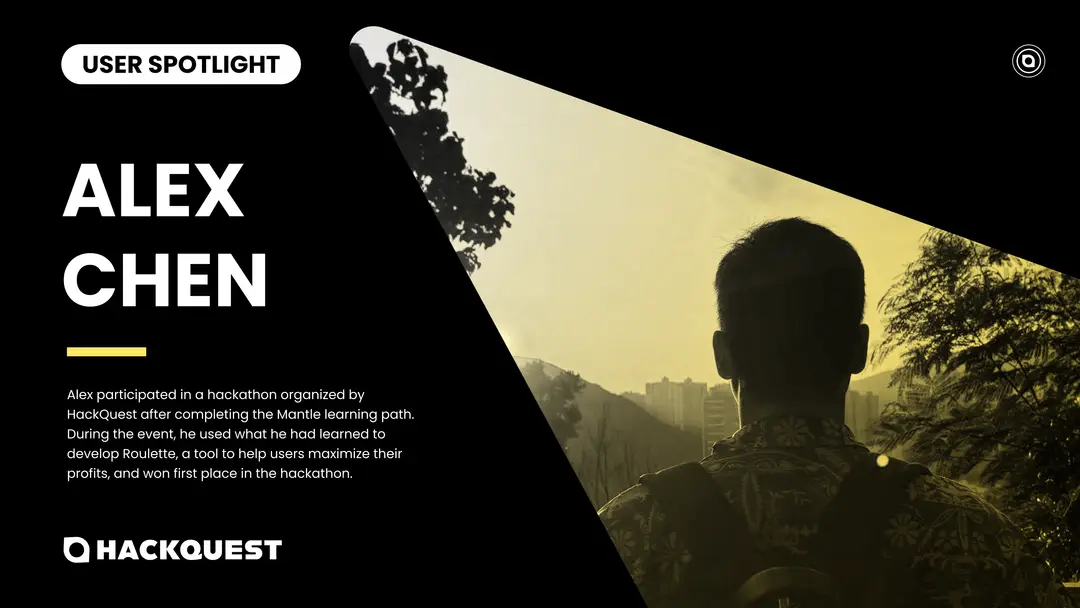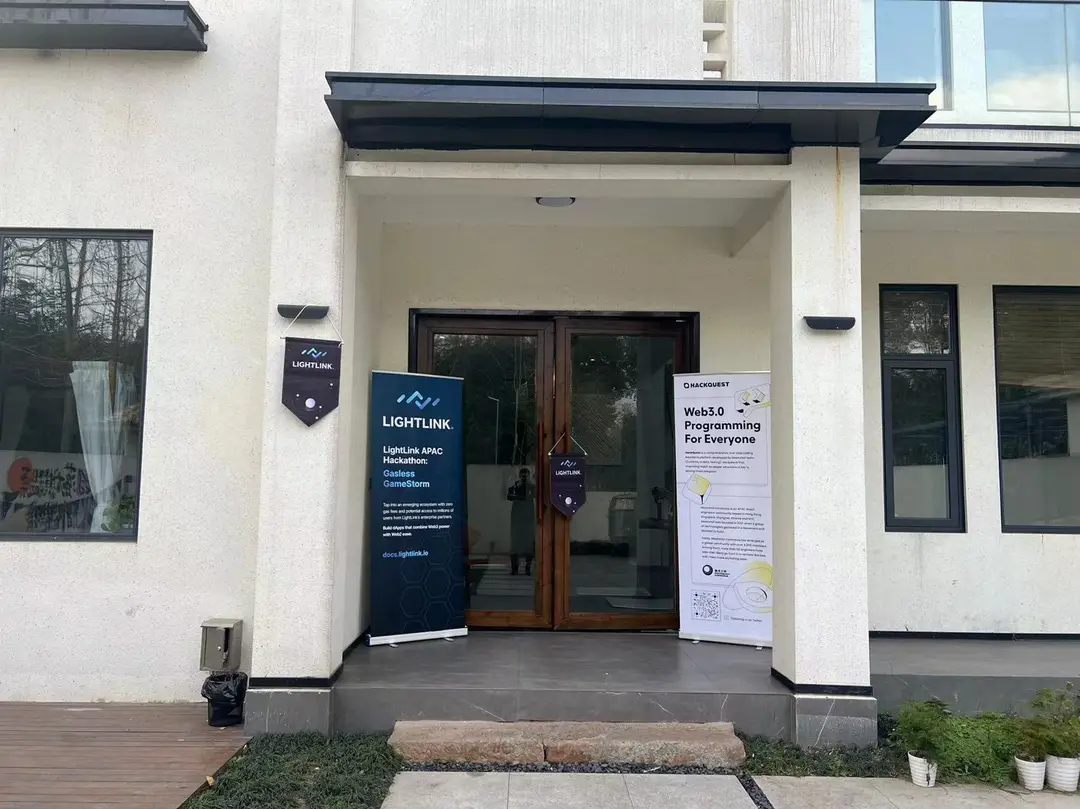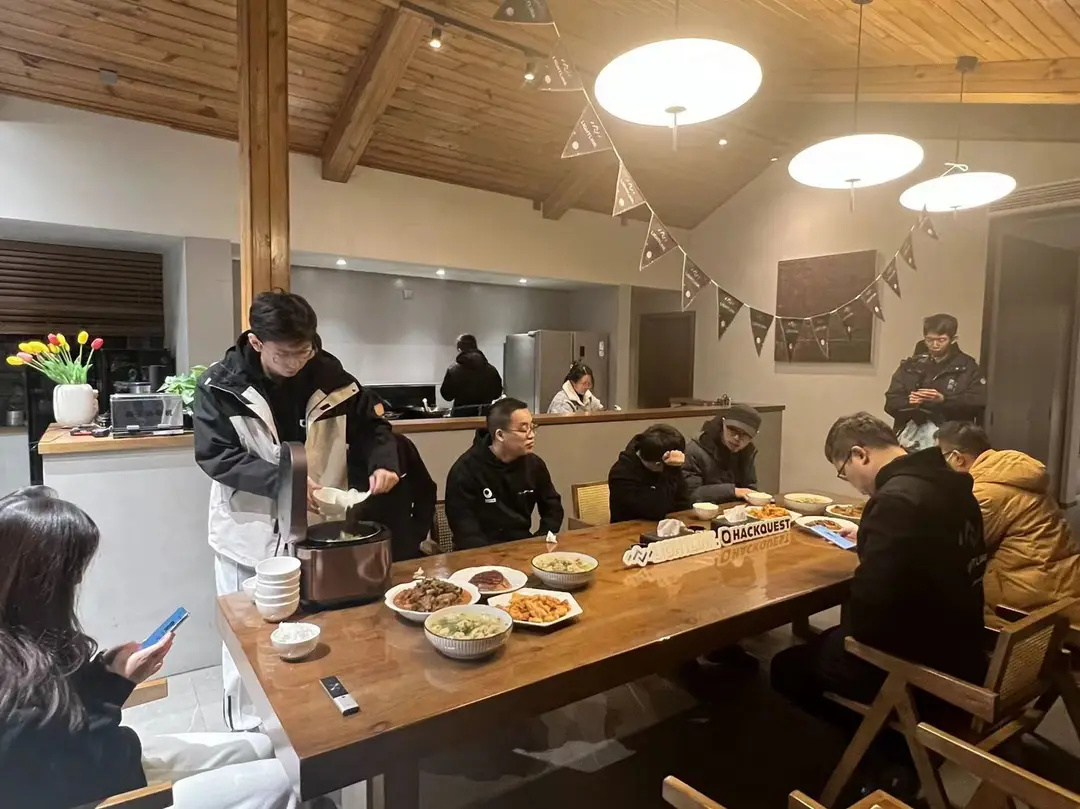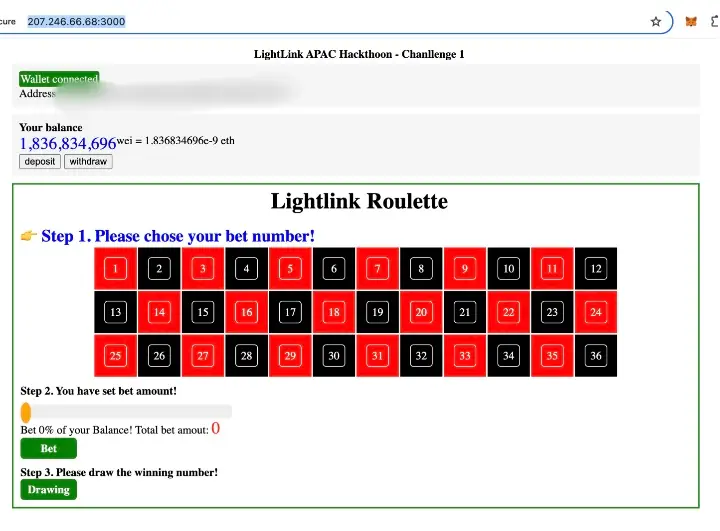返回
User Spotlight #2: Quitting Web2 - How Alex Lands His Full-time Smart Contract Developer Job in Web3
User Spotlight
By HackQuest
Aug 22,20244 min read
While learning is crucial to form the foundation, achieving Web3’s true power is through hands-on experience.
Introduction - What Brings Alex to Web3
Like many Web2 developers today, Alex has noticed that the field is not as vibrant as it was ten years ago. Before leaving his full-time job, Alex worked in big data mining for a top internet company in China. When asked why he shifted from Web2 to Web3, Alex explained that the traditional internet era has passed its peak. The pandemic has exacerbated challenges for Web2, making it clear that many areas have already been explored, leaving little room for new developments.
That’s when I started exploring new territories like Web3 and AI, where some of the unsolved issues in Web2 can be addressed.
Alex’s Learning Journey - How He Gets to Know Web3
When Alex first started exploring the Web3 field, he encountered many challenges. According to him, it was difficult to find platforms to learn more about Web3, and he wasn’t sure if the information he found was accurate. By chance, he discovered HackQuest, which accelerated his journey into Web3.
HackQuest’s co-learning camp is really helpful for new entrants like me, guiding us through the learning track. There, I learned how to become a developer in the Web3 world, along with many other things I hadn’t encountered in Web2. For instance, I realized that I could build dApps on a decentralized platform, which was super cool for me at that time.
With the foundation of the Mantle learning track, online learning, and in-person discussions, combined with his Web2 knowledge, Alex didn’t find Web3 learning excessively difficult. After completing the co-learning camp, he heard about the Inaugural APAC Hackathon co-hosted by HackQuest and Lightlink and decided to test his learning through hands-on experience.
💡
The learning path for developers should never end with just the learning phase. It’s always about execution. That’s the only way to test how much you know and what else you need to learn.

Inspired by Alex and want to start your own learning? Check out our multiple learning track offerings and kickstart your journey today!
Alex’s Hackathon Journey - How He Develops In Web3
As Alex anticipated, the hackathon was a great opportunity to test the skills he had learned. He acknowledged that the co-learning camp and the learning track were important foundations for his development in the hackathon, but he encountered problems that weren’t covered in his learning.
💡
It’s completely normal to run into unanticipated problems in a hackathon, especially early in your learning journey. Don’t be afraid to attend hackathons just because you feel you don’t know enough—most people don’t! If you don’t join any hackathons, you’ll never know where you still need to improve. Most developers have to search for the things they don’t know throughout the hackathon process to build the system, and that’s okay.
I remember when I was developing the wallet function, I noticed that the way it connected with the blockchain and how to design the data were quite different from the data collection process in Web2, which I was familiar with. That was something I hadn’t learned, so I had to do some research myself and discuss it with my team to figure it out.

Another key aspect that Alex believes sets developing in Web2 and Web3 apart is addressing users’ pain points. Web3 developers have to consider how to design the system to minimize gas fees and maximize user earnings.

Reflecting on his hackathon experience, Alex felt it was a breakthrough in his Web3 journey. Brainstorming ideas with a team of brilliant people in a hacker house for a week helped him grow quickly and learn from others. Together, with the team’s effort, they won first place, and Alex described it as “magical” to be on top in his very first hackathon.
The most precious gift I got from the hackathon was the vibe. When I was working in the Web2 space, I mainly used Chinese with my colleagues. At the hacker house, I had to communicate with the team in English, which helped me get used to collaborating in an English-speaking environment, paving the way for my transition into job-seeking in the Web3 world, where most openings require English as the work language.
Want to gain more project experience? Check out our hackathons and embark on your hackathon journey today 👇
Where Alex is Now
After a few months of job hunting, Alex landed a developer role at a Web3 trading company in Hong Kong! Reflecting on his job search journey, he shared some important lessons he learned along the way 👇
Prepare a Resume
As a Web2 developer seeking roles in Web3, Alex acknowledges that “lack of Web3 work experience” can be a disadvantage, but it doesn’t have to be a barrier to getting noticed by recruiters.
💥
Not all job openings in Web3 companies are intensely Web3-focused—there are still roles that involve Web2 components. Web2 developers transitioning to Web3 can focus on these openings.
There are many types of Web3 companies, and openings can have quite different requirements. So when preparing resumes, pay close attention to job descriptions and carefully consider what is necessary to include and what is optional but nice to have.
He mentioned that featuring several Web3 projects and experiences in the resume is crucial. Recruiters and hiring managers want to know why a candidate wants the job and if they have the required skills. As long as the candidate can demonstrate this in the resume, they have a chance to be selected for an interview.
💥
We provide a great resource for our users to build up projects! Check out our Idea Bank page now:
Prepare for Interviews
Once you reach the interview stage, it’s all about proving how you can solve the problems hiring managers want to address. When asked about the key to interviews, Alex shared that it’s very important to demonstrate to the hiring managers that you can help them solve the problems they have. To do this, he primarily talked about the Web3 projects he had completed and relevant activities he had participated in, to show that he had enough understanding of the field to excel at the job.
The key to the interview is to show your skillsets to the interviewers. Use the tools in your skillset to dissect the questions in the interview. Talk about the problems you’ve faced in previous projects and how you solved them. It’s a very straightforward way to show the transferable skills needed for the roles you apply for.
When asked about the core areas that interviewers are looking for, Alex summarized two points:
●You’re a problem solver. Make sure you understand the problems hiring managers have and the issues they need you to solve. You can even directly ask them during the interview. With this in mind, you can prepare your answers accordingly to meet their expectations.
●Personality fit is also important: both you and your interviewer want to work with someone they get along with.
General Sense of Web3 Job Market
Now, having successfully transitioned from Web2 to Web3, Alex reflected on his experiences in the Web3 job market. In general, he feels there are more opportunities and potential in the Web3 job market, as the Web2 job market is quite saturated. However, he also pointed out that while Web3 has rapidly developed in recent years, its career trajectory can be relatively confined within the field, which is something potential switchers should consider.
Now that we’ve learned about Alex’s journey, let’s see his advice for new learners and job seekers!
Advice for New Learners
1.Check whether you’re a good fit for Web3: do you believe in it?
2.Mindset is the key: don’t overthink or worry too much, concentrate on what you can do now, and communicate with more people.
3.The future of Web3 may not be very clear, but the future of Web2 is clear in that there isn’t much room for growth.
Advice for Job Seekers
1.When thinking of transitioning from Web2 to Web3, focus on transferable skills: many skills can be transferred from Web2 to Web3, so it’s not a completely fresh start.
2.The world of Web3 is highly digital, and many platforms have relevant job information.
3.Don’t worry too much about the lack of Web3 work experience—it’s a very new field, and many people don’t have tons of experience, just like you. Focus on building your own Web3 experiences: start with a simple project, participate in hackathons and events to enrich your knowledge, and make sure to highlight them in your resume and interviews.
Transitioning from Web2 to Web3 is not an easy journey. It requires a resilient mindset, constant learning, and patience. Alex stresses that this process will be challenging, and it takes time to finally get there. Therefore, you really have to be persistent and wait for the right opportunity. It may take a while, but as long as you keep the momentum and don’t give up, you’ll eventually get there. His last piece of advice: you shouldn’t consider switching to Web3 solely for monetary incentives. Think deeply about whether you truly love this field and if you want to establish your career here.
If you have any questions for Alex regarding how to pivot from Web2 to Web3, landing a job in Web3, or anything else, feel free to reach out to him on Twitter: